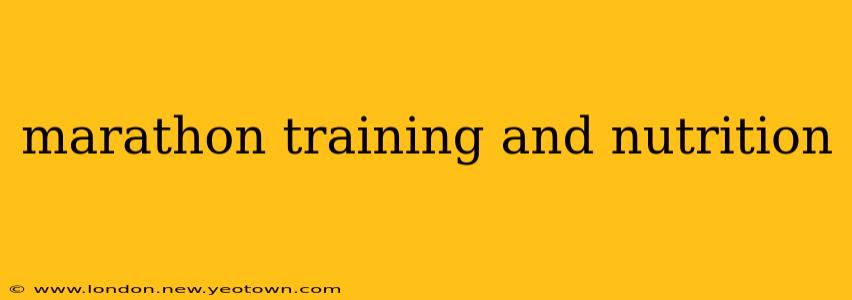The roar of the crowd, the pounding of your feet, the exhilarating finish line – completing a marathon is a monumental achievement. But reaching that triumphant moment requires more than just dedication to training; it demands a meticulously planned nutrition strategy. This isn't just about eating healthy; it's about fueling your body for peak performance, recovery, and injury prevention throughout your grueling training program and on race day itself. Let's embark on this journey together, exploring the vital role nutrition plays in your marathon quest.
What are the best foods to eat before a marathon?
This is a question many aspiring marathoners grapple with. The key is to consume a diet rich in complex carbohydrates for sustained energy, while avoiding anything that might upset your stomach. Think of it as building a stable energy foundation. In the days leading up to the race, load up on foods like oatmeal, whole-wheat pasta, sweet potatoes, and brown rice. These provide long-lasting energy without the sugar crash. On the morning of the marathon, a light breakfast, such as toast with a thin layer of jam or a small bowl of oatmeal with berries, will suffice. Avoid anything greasy or high in fiber, as these can cause digestive distress.
What should I eat during a marathon?
During the race itself, consistent fueling is paramount to prevent "hitting the wall," that dreaded point of exhaustion caused by depleted glycogen stores. Many marathon runners utilize energy gels, chews, or sports drinks strategically placed along the course. These provide a quick boost of carbohydrates and electrolytes, crucial for maintaining energy levels and hydration. Practicing with these products during your training runs is essential to determine which ones work best for your body.
How important is hydration during marathon training?
Hydration isn't just important; it's absolutely crucial. Dehydration can significantly impact your performance, leading to fatigue, muscle cramps, and even heatstroke. Start hydrating days before your marathon, and continue drinking water or electrolyte drinks consistently throughout your training and on race day. Don’t wait until you're thirsty; thirst is already a sign of mild dehydration.
What kind of diet should I follow during marathon training?
Your diet should be a balanced blend of macronutrients—carbohydrates, proteins, and healthy fats. Carbohydrates provide the fuel for your runs, proteins aid in muscle repair and growth, and healthy fats support overall health and hormone production. Ensure you're consuming enough calories to support your increased activity level. A registered dietitian specializing in sports nutrition can help you create a personalized meal plan to meet your individual needs.
What are the best snacks for marathon runners?
Snacks should be easily digestible and provide a quick source of energy. Think bananas, applesauce, energy bars (check the sugar content!), trail mix (without too many dried fruits which can cause stomach issues for some), and rice cakes with peanut butter. Experiment during training to find what works best for you, and always prioritize easily digestible options.
How can I avoid stomach problems during a marathon?
Gastrointestinal issues are a common concern for marathon runners. To minimize this risk, stick to foods you know your body tolerates well during training and on race day. Avoid new foods or large quantities of high-fiber foods before a race. Gradually introduce new energy gels or chews into your training regimen to see how your body reacts. Consider consulting a gastroenterologist if you've experienced persistent stomach issues during previous races.
What are some common nutritional mistakes marathon runners make?
One common mistake is neglecting proper carbohydrate loading before a race. Another is not consistently fueling during long runs. Underestimating the importance of hydration is another prevalent issue. Many runners also make the mistake of trying new foods or supplements on race day, which can lead to digestive problems. Finally, ignoring adequate protein intake for muscle recovery after intense training sessions is a frequently overlooked aspect.
Conclusion: Fuel Your Success
Marathon training is a significant undertaking, demanding both physical and mental strength. By prioritizing a well-planned nutrition strategy, you equip yourself to overcome the challenges, achieve peak performance, and enjoy the exhilarating journey to the finish line. Remember, it’s not just about the miles you run; it's about the fuel that powers you. Remember to consult with a registered dietitian or sports nutritionist to tailor a plan to your individual needs and goals. They can provide personalized guidance, ensuring you're optimally fueled for success.

